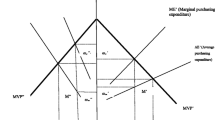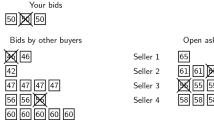Abstract
It is a standard result of search theory that the optimal reservation supply price, e.g. wage, is negatively correlated to search costs. This paper applies the inverse relationship, between demand prices and limit prices, to the analysis of an hitherto unexplored topic: trade fairs. Trade fairs bloomed during the Middle Ages and early trade-based capitalism and survived for centuries. In last decades, their growth became sustained: they attract every year hundreds of thousands of exhibitors and tens of millions of visitors.
The driving forces behind the trade fair activity are increasing return to scale of search for information, under conditions of imperfect competition, particularly large group monopolistic competition. Under these circumstances, trade fairs offer their participants a collective substitute for information activities that would be beyond individual possibilities. This mechanism is of paramount importance for small firms. Where there are many small suppliers and buyers, and product differentiation, trade fairs give agents the opportunity of low-cost, high-density information exchanges, under spacetime constraints. This leads to lower search costs and lower limit prices, then fairer trades. But this mechanism also implies natural monopoly or oligopoly: the larger the trade fair, i.e. the larger the number of suppliers and visitors who participate, the less the average cost of the service. More generally, natural monopolies arising from decreasing-to-scale search costs ask for a new view of government's role either in the organization or in the regulation of information exchanges. Policy implications for small business development are stressed, including tariff regulation, public investment, and involvement of small business associations in the design and organization of trade fairs.
Similar content being viewed by others
References
Akerlof, George, 1970, ‘The Market for “Lemons”: Qualitative Uncertainty and the Price Mechanism’,Quarterly Journal of Economics 84(3), 488–500.
Bonoma, Thomas V., 1983, ‘Get More Out of Your Trade Shows: An Analytic Approach’,Harvard Business Review 83(1), 75–83.
Browning, John M. and Ronald J. Adams, 1988, ‘Trade Shows: An Effective Promotional Tool for the Small Industrial Business’,Journal of Small Business Management 26(4), 31–36.
Chan, Yuk-shee and Hayne Leland, 1982, ‘Prices and Qualities in Markets with Costly Information’,Review of Economic Studies 49(4), 499–516.
Florio, Massimo, 1989, ‘The Economics of Trade Fairs’, paper presented at the XVI Earie Conference, Budapest (mimeo).
Grether, David M., Alan Schwartz and Louis L. Wilde, 1992, ‘Price, Quality and Timing of Moves in Markets with Incomplete Information: An Experimental Analysis’,Economic Journal 102(4), 754–771.
Hey, John D., 1979,Uncertainty in Microeconomics, Oxford: Martin Robertson.
Postan, Moisei M. and Peter Mathias (eds), 1976,The Cambridge Economic History of Europe, Cambridge: Cambridge University Press.
Rosson, Philip J. and Rolf F. H. Seringhaus, 1991, ‘Industrial Trade Fairs from the Other Side: The Visitor Perspective’, paper presented at the VII IMP conference, Uppsala (mimeo).
Salop, Steven and Joseph Stiglitz, 1977, ‘Bargains and Ripoffs: A Model of Monopolistically Competitive Price Dispersion’,Review of Economic Studies 44(3), 493–510.
Schwartz, Alan and Louis L. Wilde, 1982, ‘Imperfect Information, Monopolistic Competition and Public Policy’,American Economic Review (Papers and proceedings)72(2), 18–24.
Author information
Authors and Affiliations
Rights and permissions
About this article
Cite this article
Florio, M. Fair trades by trade fairs: Information providing institutions under monopolistic competition. Small Bus Econ 6, 267–281 (1994). https://doi.org/10.1007/BF01108394
Accepted:
Issue Date:
DOI: https://doi.org/10.1007/BF01108394




